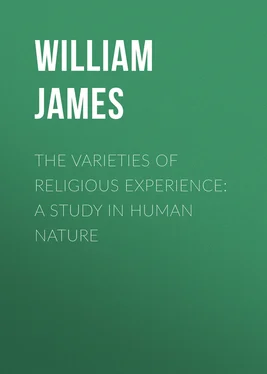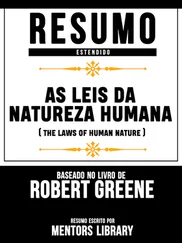William James - The Varieties of Religious Experience - A Study in Human Nature
Здесь есть возможность читать онлайн «William James - The Varieties of Religious Experience - A Study in Human Nature» — ознакомительный отрывок электронной книги совершенно бесплатно, а после прочтения отрывка купить полную версию. В некоторых случаях можно слушать аудио, скачать через торрент в формате fb2 и присутствует краткое содержание. Жанр: foreign_prose, foreign_religion, Философия, foreign_psychology, foreign_antique, на английском языке. Описание произведения, (предисловие) а так же отзывы посетителей доступны на портале библиотеки ЛибКат.
- Название:The Varieties of Religious Experience: A Study in Human Nature
- Автор:
- Жанр:
- Год:неизвестен
- ISBN:нет данных
- Рейтинг книги:4 / 5. Голосов: 1
-
Избранное:Добавить в избранное
- Отзывы:
-
Ваша оценка:
- 80
- 1
- 2
- 3
- 4
- 5
The Varieties of Religious Experience: A Study in Human Nature: краткое содержание, описание и аннотация
Предлагаем к чтению аннотацию, описание, краткое содержание или предисловие (зависит от того, что написал сам автор книги «The Varieties of Religious Experience: A Study in Human Nature»). Если вы не нашли необходимую информацию о книге — напишите в комментариях, мы постараемся отыскать её.
The Varieties of Religious Experience: A Study in Human Nature — читать онлайн ознакомительный отрывок
Ниже представлен текст книги, разбитый по страницам. Система сохранения места последней прочитанной страницы, позволяет с удобством читать онлайн бесплатно книгу «The Varieties of Religious Experience: A Study in Human Nature», без необходимости каждый раз заново искать на чём Вы остановились. Поставьте закладку, и сможете в любой момент перейти на страницу, на которой закончили чтение.
Интервал:
Закладка:
Now it would be too absurd to say that the inner experiences that underlie such expressions of faith as this and impel the writer to their utterance are quite unworthy to be called religious experiences. The sort of appeal that Emersonian optimism, on the one hand, and Buddhistic pessimism, on the other, make to the individual and the sort of response which he makes to them in his life are in fact indistinguishable from, and in many respects identical with, the best Christian appeal and response. We must therefore, from the experiential point of view, call these godless or quasi-godless creeds “religions”; and accordingly when in our definition of religion we speak of the individual's relation to “what he considers the divine,” we must interpret the term “divine” very broadly, as denoting any object that is god like , whether it be a concrete deity or not.
But the term “godlike,” if thus treated as a floating general quality, becomes exceedingly vague, for many gods have flourished in religious history, and their attributes have been discrepant enough. What then is that essentially godlike quality—be it embodied in a concrete deity or not—our relation to which determines our character as religious men? It will repay us to seek some answer to this question before we proceed farther.
For one thing, gods are conceived to be first things in the way of being and power. They overarch and envelop, and from them there is no escape. What relates to them is the first and last word in the way of truth. Whatever then were most primal and enveloping and deeply true might at this rate be treated as godlike, and a man's religion might thus be identified with his attitude, whatever it might be, towards what he felt to be the primal truth.
Such a definition as this would in a way be defensible. Religion, whatever it is, is a man's total reaction upon life, so why not say that any total reaction upon life is a religion? Total reactions are different from casual reactions, and total attitudes are different from usual or professional attitudes. To get at them you must go behind the foreground of existence and reach down to that curious sense of the whole residual cosmos as an everlasting presence, intimate or alien, terrible or amusing, lovable or odious, which in some degree every one possesses. This sense of the world's presence, appealing as it does to our peculiar individual temperament, makes us either strenuous or careless, devout or blasphemous, gloomy or exultant, about life at large; and our reaction, involuntary and inarticulate and often half unconscious as it is, is the completest of all our answers to the question, “What is the character of this universe in which we dwell?” It expresses our individual sense of it in the most definite way. Why then not call these reactions our religion, no matter what specific character they may have? Non-religious as some of these reactions may be, in one sense of the word “religious,” they yet belong to the general sphere of the religious life , and so should generically be classed as religious reactions. “He believes in No-God, and he worships him,” said a colleague of mine of a student who was manifesting a fine atheistic ardor; and the more fervent opponents of Christian doctrine have often enough shown a temper which, psychologically considered, is indistinguishable from religious zeal.
But so very broad a use of the word “religion” would be inconvenient, however defensible it might remain on logical grounds. There are trifling, sneering attitudes even towards the whole of life; and in some men these attitudes are final and systematic. It would strain the ordinary use of language too much to call such attitudes religious, even though, from the point of view of an unbiased critical philosophy, they might conceivably be perfectly reasonable ways of looking upon life. Voltaire, for example, writes thus to a friend, at the age of seventy-three: “As for myself,” he says, “weak as I am, I carry on the war to the last moment, I get a hundred pike-thrusts, I return two hundred, and I laugh. I see near my door Geneva on fire with quarrels over nothing, and I laugh again; and, thank God, I can look upon the world as a farce even when it becomes as tragic as it sometimes does. All comes out even at the end of the day, and all comes out still more even when all the days are over.”
Much as we may admire such a robust old gamecock spirit in a valetudinarian, to call it a religious spirit would be odd. Yet it is for the moment Voltaire's reaction on the whole of life. Je m'en fiche is the vulgar French equivalent for our English ejaculation “Who cares?” And the happy term je m'en fichisme recently has been invented to designate the systematic determination not to take anything in life too solemnly. “All is vanity” is the relieving word in all difficult crises for this mode of thought, which that exquisite literary genius Renan took pleasure, in his later days of sweet decay, in putting into coquettishly sacrilegious forms which remain to us as excellent expressions of the “all is vanity” state of mind. Take the following passage, for example,—we must hold to duty, even against the evidence, Renan says,—but he then goes on:—
“There are many chances that the world may be nothing but a fairy pantomime of which no God has care. We must therefore arrange ourselves so that on neither hypothesis we shall be completely wrong. We must listen to the superior voices, but in such a way that if the second hypothesis were true we should not have been too completely duped. If in effect the world be not a serious thing, it is the dogmatic people who will be the shallow ones, and the worldly minded whom the theologians now call frivolous will be those who are really wise.
“ In utrumque paratus , then. Be ready for anything—that perhaps is wisdom. Give ourselves up, according to the hour, to confidence, to skepticism, to optimism, to irony, and we may be sure that at certain moments at least we shall be with the truth.... Good-humor is a philosophic state of mind; it seems to say to Nature that we take her no more seriously than she takes us. I maintain that one should always talk of philosophy with a smile. We owe it to the Eternal to be virtuous; but we have the right to add to this tribute our irony as a sort of personal reprisal. In this way we return to the right quarter jest for jest; we play the trick that has been played on us. Saint Augustine's phrase: Lord, if we are deceived, it is by thee! remains a fine one, well suited to our modern feeling. Only we wish the Eternal to know that if we accept the fraud, we accept it knowingly and willingly. We are resigned in advance to losing the interest on our investments of virtue, but we wish not to appear ridiculous by having counted on them too securely.” 12
Surely all the usual associations of the word “religion” would have to be stripped away if such a systematic parti pris of irony were also to be denoted by the name. For common men “religion,” whatever more special meanings it may have, signifies always a serious state of mind. If any one phrase could gather its universal message, that phrase would be, “All is not vanity in this Universe, whatever the appearances may suggest.” If it can stop anything, religion as commonly apprehended can stop just such chaffing talk as Renan's. It favors gravity, not pertness; it says “hush” to all vain chatter and smart wit.
But if hostile to light irony, religion is equally hostile to heavy grumbling and complaint. The world appears tragic enough in some religions, but the tragedy is realized as purging, and a way of deliverance is held to exist. We shall see enough of the religious melancholy in a future lecture; but melancholy, according to our ordinary use of language, forfeits all title to be called religious when, in Marcus Aurelius's racy words, the sufferer simply lies kicking and screaming after the fashion of a sacrificed pig. The mood of a Schopenhauer or a Nietzsche,—and in a less degree one may sometimes say the same of our own sad Carlyle,—though often an ennobling sadness, is almost as often only peevishness running away with the bit between its teeth. The sallies of the two German authors remind one, half the time, of the sick shriekings of two dying rats. They lack the purgatorial note which religious sadness gives forth.
Читать дальшеИнтервал:
Закладка:
Похожие книги на «The Varieties of Religious Experience: A Study in Human Nature»
Представляем Вашему вниманию похожие книги на «The Varieties of Religious Experience: A Study in Human Nature» списком для выбора. Мы отобрали схожую по названию и смыслу литературу в надежде предоставить читателям больше вариантов отыскать новые, интересные, ещё непрочитанные произведения.
Обсуждение, отзывы о книге «The Varieties of Religious Experience: A Study in Human Nature» и просто собственные мнения читателей. Оставьте ваши комментарии, напишите, что Вы думаете о произведении, его смысле или главных героях. Укажите что конкретно понравилось, а что нет, и почему Вы так считаете.












